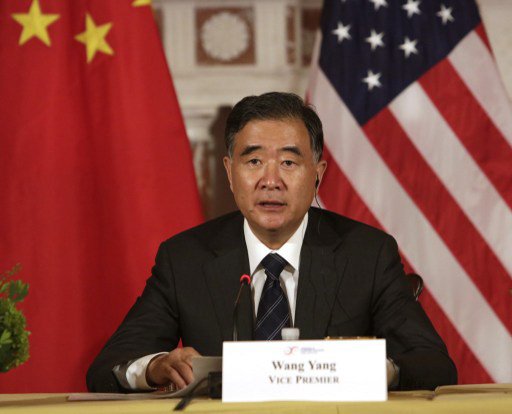DAVAO CITY — One of the highest-ranking Chinese officials to visit the Philippines said his country was ready to help President Duterte realize his dream of building a railway to connect key Mindanao areas with one another.
Chinese Vice Premier Wang Yang, however, said he was still unsure how.
Speaking through an interpreter during a visit here on Saturday, Wang said China’s help could be in the form of a loan or Chinese investors taking part in the Philippine government’s public-private partnership (PPP) scheme.
Wang was the main guest at the presentation of the proposed Mindanao railway, which would cost P218 billion and run at least 830 kilometers, and other major projects that the Duterte administration is selling to China for funding.
Although he expressed support for the project, Wang said he wanted a feasibility study done first if a railway was the most practical way to connect key Mindanao cities like Davao, Zamboanga, Butuan, Surigao, Cagayan de Oro, Iligan and General Santos.
Wang said he also wanted to know how the project could impact people.
Next steps
Ma. Lourdes Lim, director for Southern Mindanao of the National Economic and Development Authority, said Wang had pledged to send a team to study the proposed railway and other infrastructure projects presented to him and his 40-man delegation.
Lim said Chinese Ambassador Zhao Jianhua was returning to Mindanao “later this month, and a Chinese mission” is arriving next month to look closely at the proposed projects.
Under the proposal, the first phase of the railway project will connect the Davao cities of Tagum in Davao del Norte, Davao City and Digos in Davao del Sur.
Funding from loans, PPP
The first phase, which entails the building of at least 105 km of tracks, dozens of passenger terminals and other facilities, is estimated to cost P31.3 billion and for implementation by the Department of Transportation.
Funding for the first phase could come from a loan or through the PPP scheme.
According to Lim, Wang wanted to be given more details of the project, such as what preparations had been made, terms of reference and other activities leading to full implementation.
Lim said Wang also expressed interest in the proposed Davao Airport Development Project, which would cost P40 billion. The project includes the construction of a parallel taxiway and the expansion of passenger and terminal areas in the existing airport.
Wang, touted to be one of China’s leading reformers, had been credited with turning Guangdong province into a model of development.
The Guangdong experience put weight on private enterprises as growth catalysts. Wang was Guangdong’s party committee secretary before his rise to become the fourth most powerful member of the Chinese politburo. —Allan Nawal
